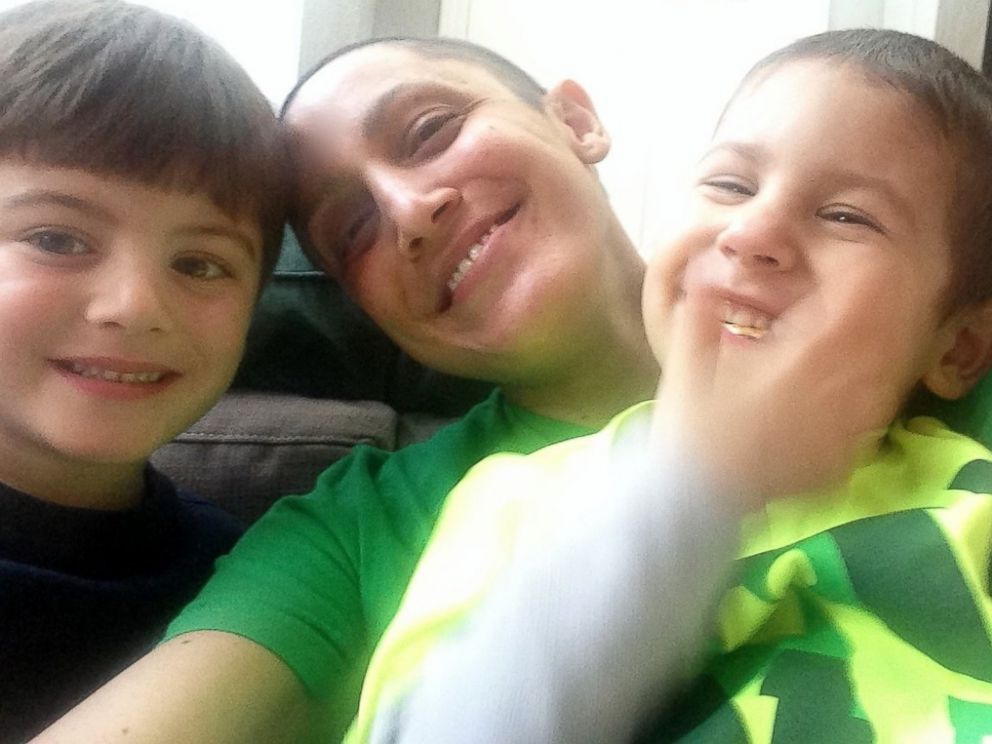Under 'Trumpcare,' women battling metastatic cancer worry they'll be seen as 'lost cause'
Premiums could skyrocket for some people battling terminal illnesses.
— -- Amanda Petersen wants people to know that having metastatic breast cancer doesn't define her. The 40-year-old West Virginia native is also a wife, a stepmother, a proud aunt and an advocate who works to support other people with terminal cancer. Part of the freedom to define herself, she said, has come from knowing she has her family's support and access to the medical treatment she needs.
"I feel like a spoiled brat, frankly, in terms of how lucky I have been, and I am 1000 percent aware of it," Petersen told ABC News. "I also know that I'm not the everyday case. Not everybody has that."
But on Thursday, as she watched President Donald Trump and House Republican leaders celebrate the passage of the American Health Care Act in the House, she said she was taken aback.
"Honestly, my reaction was total confusion," Petersen said. "I had no idea what changed and how we got people to change their votes [in the House] who had voted against it before. Plus, a major change had to do with folks with pre-existing conditions, and it's not a favorable change."
The bill is currently in the Senate, where it is likely to be rewritten in some part. The revised bill will then be sent back to the House for approval, and both chambers will need to agree on a single, final version before it heads to the president’s desk. Petersen said the whole process of repealing and replacing the Affordable Care Act has made the future of health care for people like her uncertain.
After she was diagnosed with stage II breast cancer at the age of 34, she said she moved in with her parents to save money for her care. When she wasn't able to continue working at West Virginia University because of her health, the campus' "catastrophic leave" policy -- which allowed her to keep earning a salary for a year thanks to paid time off donated by her colleagues -- was a blessing, she said.
She said she currently relies on disability payments and private insurance through her husband's job at a local newspaper. The couple pays a premium of about $450 per month to insure themselves and their stepdaughter.

How premiums for people with pre-existing conditions could skyrocket
Petersen isn't the only person with a pre-existing condition who is worried about the effects of the AHCA. A Center for American Progress analysis of data from the Centers for Medicare and Medicaid Services, published last month, estimated what yearly premium surcharges might look like for people with pre-existing conditions. CAP found that companies could charge metastatic patients premium surcharges of as much as $142,650 per year.
Sam Berger, a senior policy adviser at the Center for American Progress, co-authored the group's analysis.
"In addition to the widespread damage this bill would cause for millions of people, it would also have significant negative effects for those with metastatic cancer specifically," Berger told ABC News via email. "If a state chose to waive protections for pre-existing conditions, then any individual with a two-month gap in coverage, including any of the 24 million people who would lose coverage under the AHCA [as estimated for a previous draft by the nonpartisan Congressional Budget Office], could be charged a higher rate based on their cost of care."
The change in protections for people with pre-existing conditions comes from what is known as the McArthur Amendment to the AHCA. Under the provision, states could be granted waivers to administer their own high-risk pools, as long as they can prove their approach will lower costs or increase coverage. People with pre-existing conditions could also be charged more if they have a gap in coverage of 63 days or longer.
"In a state that adopted a waiver, people would with pre-existing conditions like a history of cancer could be charged more with no limit in premiums," Aviva Aron-Dine, senior fellow and counselor at the Center on Budget and Policy Priorities, told ABC News.
CAP's analysis represents what people would pay if insurance companies charged them the "full expected cost of their pre-existing condition," Aron-Dine explained.
And while companies couldn't write off people as "uninsurable," as they did before the 2010 passage of the Affordable Care Act, they could make costs so high that people couldn't afford it, Aron-Dine said.
"Under the House bill, insurers would not be able to deny coverage. So what they would do instead is offer people coverage with a premium with which there is no way they would take up coverage," she said. "I think people might well be offered premiums that are in no way realistic."
The AHCA could also allow employer insurance plans like Petersen's husband's to reinstate pre-Obamacare caps on coverage, leading to higher out-of-pocket expenses.
"What the waivers under this plan would do is let employer plans go back to putting annual and lifetime limits on coverage. So for people with cancer, that often meant they hit their annual or lifetime limits over the course of a year of treatment and could face medical bankruptcy even if they were insured," Aron-Dine said.

The uncertain futures of Medicare and Medicaid
Petersen said she was the family's breadwinner before her illness forced her to leave work. Increased out-of-pocket costs could put an even greater strain on her family's ability to pay for her care, she said. She estimated that she has already spent $6,000 out of pocket this year for her treatment. If the House bill passes the Senate in its current form and insurance companies are able to charge premium surcharges like the ones in CAP's analysis, they would be more than double her household income, Petersen added.
The uncertainty of how she would pay for her treatment in the future, and how others with less income would be able to get by, leaves her feeling frustrated, she added.
"I try to stay objective and look at these things objectively, but this is gross to me," Petersen said. "It's about politics. It's about just being able to say they undid something that [former President Barack] Obama did. And I truly don't believe it's the right thing for our country."
For metastatic patients who rely on Medicare, the possible impact of the AHCA is less clear.
Beth Fairchild, president and director of outreach at METAvivor, was 34 and working as a self-employed artist when she was diagnosed with de novo metastatic breast cancer.
"I went in to have a routine hysterectomy," Fairchild told ABC News. "When I woke up from my surgery, they told me that I had stage IV breast cancer that had metastasized to my ovaries, and, as we later found out, also to my liver and my bones."
"It was kind of surreal -- like I was watching a movie, like the news couldn't possibly have been about me," she said.

Just a few months before her May 2014 diagnosis, Fairchild had purchased health insurance through the marketplace under the Affordable Care Act. She said she paid about $300 per month.
In 2016, when she became too sick to work and worried how she would afford insurance, Fairchild said she went on disability.
"Once I realized that Donald Trump had won the election, I signed up for disability. Because I knew his goal was to make the ACA go away," Fairchild said. "Because that's where I had bought my health insurance, I thought that I had to sign up for disability or else I was not going to be able to have insurance."
Fairchild said she is now on Medicare, and she pays an additional $800 per month for supplemental insurance.
"I'm so glad I did that, because even though I am paying more out-of-pocket now, it sure beats the offer that's on the table for people with metastatic cancer or any chronic, catastrophic disease," she said.
For Medicare patients like Fairchild, the House version of the AHCA changes little at the moment, according to Tricia Neuman, senior vice president and director of the Medicare policy program at the Kaiser Family Foundation.
"The American Health Care Act would actually retain most of the Medicare provisions that were in the ACA," Neuman told ABC News.
But patients who rely on Medicare could see changes in the future, depending on how the program that currently serves an average of 57.7 million people per month is financed.
"There is a provision that was put in the ACA that strengthens the Medicare program's financing by imposing a payroll tax surcharge on high earners, and the proposal to repeal and replace Obamacare would repeal this provision beginning in 2023. It's not clear yet what the effect will be, but it does have the effect of weakening Medicare's finances," Neuman said.
For others who may eventually need to rely on both Medicaid and Medicare to pay for their care, the impact of the AHCA could be greater.
"There is an intersection between Medicare and Medicaid," Neuman said. "So while this bill doesn't directly affect Medicare benefits and coverage so much, it does include significant reductions and change in structure for Medicaid. And one in five people on Medicare relies on Medicaid for additional support."
Obamacare was a 'get-out-of-jail-free card'
The uncertainty of how her benefits will change over time adds to the stress of dealing with a terminal illness, Fairchild said.
"People who are dealing with these terminal illnesses have enough on their plate. You're already dealing with the emotional impact on your family, the financial toxicity of having cancer and on top of that, you have to worry about, 'Can I even afford treatment, can I even afford insurance?' That's ridiculous," Fairchild said.
The feeling that the AHCA is taking away benefits that were hard-won is disheartening, she added.
"This country, under the Obama administration, handed people like me a get-out-of-jail-free card with the ACA. They said, 'Yes, what you're going through sucks, but we're going to make it so it doesn't have to be so terrible.' And the worst part is now they're ripping that away," Fairchild said.
Aron-Dine said reforming the ACA should be about progress.
"I think the standard for a final bill should be that it moves us forward in terms of ensuring that people can get access to quality and affordable health care," Aron-Dine said. "In practice, I think that would mean going back to the drawing board on this bill because these are not incidental features."
Petersen said she wants lawmakers to remember that metastatic patients deserve to have a future, too.
"A stage IV diagnosis does not make a person a lost cause, especially at this time in the evolution of medicine where technological advances are occurring daily," Petersen said. "I am not a lost cause."




